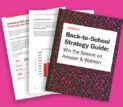
Categories
Latest Posts
Tags
Advertising Amazon Amazon Advertising Amazon Experts Amazon Listing Optimization Amazon Marketplace Amazon News Amazon Prime Amazon Professional Sellers Summit Amazon Seller amazon sellers Amazon Seller Tips Amazon Seller Tools ASIN Brand Management Brands Buy Box Campaign Manager Conference COVID-19 downloadable Dynamic Pricing Ecommerce FBA FBM Holiday Season industry news Multi-Channel Fulfillment Optimize pay-per-click Pricing Algorithm Pricing Software Private Label Profits Repricing Repricing Software Revenue Sales Seller Seller-Fulfilled Prime Seller Performance Metrics SEO SKU Sponsored Products Ads Strategy
Get the latest insights right in your inbox
Resource | Blog

Amazon, Walmart, and Target Take a New Approach to Returns
Retailers are issuing refunds without requiring customers to return select merchandise. Learn how the strategy can be cost-effective for your business.
Catherine Ibarra
Catherine Ibarra is a marketing consultant at Feedvisor, where she contributes to the company's content marketing initiatives. She has a technology background.
Amazon, Walmart, Target, and more retailers are letting customers keep merchandise they intended to return while issuing refunds, according to The Wall Street Journal.
Some retailers are utilizing artificial intelligence (AI) to determine whether it is financially beneficial to process a return. A product that is inexpensive or large in size, which would incur a greater shipping fee, is less likely to be processed as a return since it is more cost-effective for a retailer to refund the purchase price and allow the customer to keep or donate the product.
How It Began
The move to let customers keep or donate the merchandise they intended to return comes as the COVID-19 pandemic led consumers to shop online more than ever before, especially during Q4. There was a 44% increase in online-only shoppers during the Turkey Five, per Feedvisor data. Furthermore, e-commerce sales grew by 21% year over year (YoY) during the same period of time.
Retailers anticipate a returns frenzy due to the surge in online holiday shopping. U.S. consumers are projected to return $101 billion worth of products purchased online throughout the holiday season, according to a report by the National Retail Federation. The value in returns expected is astonishing as consumers returned approximately $428 billion in merchandise in the 2020 fiscal year.
To prepare for the returns from holiday sales, retailers have begun implementing relatively new return practices that will alleviate a portion of their financial burden and help meet consumer needs. The initiative to allow customers to keep the low-cost or large product they wanted to return while issuing a refund was adopted across multiple retailers. Amazon, in particular, lengthened its holiday return policy by a month. Walmart partnered with FedEx to make returns more accessible to its customers.
Returns have always been a hassle for both retailers and consumers, but the rise in e-commerce makes the returns process more challenging. A quarter of U.S. consumers reported their biggest pain point for returning a product ordered online is having to drop off their package at a mail facility, per eMarketer data. The strategy of eliminating the return option altogether and refunding customers is not only cost-effective for the retailer but also optimizes the customer experience.

Maximize Profits By Harnessing Feedvisor’s AI to Optimize Pricing and Advertising Strategies
Reduce Return Expenses for Your Business
Although huge retailers are currently allowing customers to keep their unwanted products while issuing refunds, brands and sellers who manage their own fulfillment can replicate this system as well to lower their return expenses. Allowing customers to skip the returns process for low-cost or large products will improve their experience with your business, foster shopper loyalty, and improve your customer retention rate.
Processing an online return can cost a business $10–$20, which does not include the freight fee. If the merchandise a customer intends to return falls below the cost to process a return, it is preferable to allow the customer to keep or donate the product and issue a refund. Products that may offer brands and sellers cost-saving benefits to nix returns for are books, journals, folders, tumblers, mugs, and many more.
In addition to lowering the cost of returns, eliminating returns for certain products can also help maintain a healthy logistics system. Retailers who process a massive quantity of returns run the risk of overloading their logistics system and subsequently encounter shipping delays. Brands and sellers who choose not to process returns for specific merchandise will ensure their logistics system operates smoothly.




